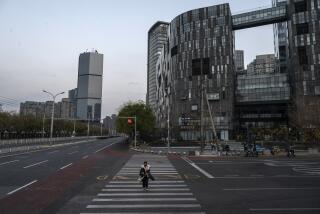China’s Townships Making Great Leaps
- Share via
HELIE, China — Jiang Ronghao, ditch digger turned factory boss, is a living example of how China is outracing India to the future.
Jiang, a self-assured manager, is 49, almost exactly the age of the People’s Republic of China. He lives with his family in this affluent suburb of Wuxi, a city of 1 million on Lake Tai, three hours by train west of Shanghai.
Helie boasts its own KFC restaurant, stylish clothing stores and an assortment of upscale eateries and karaoke bars, including the city-owned Hawaii Entertainment City, where officials often host foreign guests.
Until 1979, when the economic reforms of the late Chinese leader Deng Xiaoping began, this was an agricultural town with a national reputation as the birthplace of Rong Yiren, an industrialist who is this nation’s vice president and is nicknamed its “red capitalist.”
“Our generation is quite special--we have tasted bitterness and we have seen happiness,” Jiang said in an interview at Wuxi Batong Electronics Co., where 580 employees make components for domestic and foreign television sets. “Only 15 years ago, it was still a problem finding enough to eat. I did not have a lightbulb in my house. We were still using an oil lamp.”
Now, he boasts, “I have everything that an American family has”--three TV sets, two cellular telephones, a refrigerator, microwave oven, gas stove, water heater and personal use of five company automobiles, including a Mercedes-Benz.
The company that he founded in 1980 with money provided by the Helie township showed a profit of $5.5 million last year; 30% of its products are exported, some to North America.
Although impressive, such success stories are not unusual in this part of eastern China.
Xu Fumin, 50, was also born and raised in Helie, where his widowed mother raised silkworms. Eighteen years ago, when the government grip on the economy began to relax, the township gave him barren land, which he flooded and turned into a profitable fish farm. Now his “township enterprise”--Helie Fishery Industry and Commerce Co.--produces 6 million pounds of fish, meat and eggs.
Ten years ago, Xu opened a duck restaurant in Sydney, Australia. His company, which last year made a profit of $4 million, has moved into food processing and expanded its restaurant business, which it supplies from its own farms. Under the Chinese system, most profit goes back to the Communist Party-led township that financed it.
In one of his Wuxi restaurants, packed with well-dressed customers, Xu said: “I consider myself a peasant. Just one of China’s 800 million peasants.”
Wuxi, hub of a metropolitan area of 4.2 million people, is one of the richest cities in China. But Helie, population 33,000, is even richer. Its per capita gross domestic product is $3,500--nearly seven times the national average. Business is so good that the township has had to import 8,500 workers from other provinces.
More remarkable than the prosperity is the speed with which Helie achieved it. Although huge disparities exist across China, particularly between the booming coastal regions and the isolated interior, Helie’s development follows a recognizable pattern generally not found in India.
At the end of World War II and the civil war in which the Communists defeated the Nationalists (1945-49), Helie was an almost totally agricultural area, which included fish farming in Lake Tai.
The local economy was controlled by a handful of rich landlords. But Communist-appointed “grass-roots” cadres confiscated the farmland in the name of the people.
In some cases, farsighted landlords and industrialists such as Rong’s family voluntarily turned their assets over to the new state. They were spared when the new regime killed 1 million landlords in 1950, and, in the case of Rong, he eventually was installed as a token “capitalist” at the heart of the Communist state.
After 1949, the farmland of Helie was collectivized, managed by the Helie People’s Commune. In the 1958-61 “Great Leap Forward,” townsfolk even ate in a communal kitchen.
Conforming to a national development scheme that was inefficient and had no chance of success, the commune also organized makeshift pig-iron foundries and crude manufacturing plants to try to jump into the industrial age.
The communal kitchens were shut in 1962. But the period of hardship caused by the Great Leap Forward was followed by a decade of ideological zealotry in the 1966-76 Cultural Revolution.
Jiang had just graduated from high school when the Cultural Revolution began. Schools and universities all over China were closed.
Jiang, who wanted to be an electrical engineer, went to work in his hometown as a ditch digger and farmer. He was a manual laborer until 1980, when he persuaded city leaders to lend him money to build an electronics component factory in a cornfield on the edge of town.
By this time, collective farms had been dismantled. Under the new “responsibility” system put in place by Deng, farmers could sell surplus crops on an open market.
The commune that once ruled every aspect of life and work here had been converted into the more benign xiang--a rural administrative area or township. Production brigades were now organized into “villages.” Production teams were simply teams or work units.
The final critical change came in the management structure. The cumbersome, inefficient management committee was replaced by a single manager, a direct line of authority nearly identical to that found in capitalist countries.
Jiang is the manager.
But the changes here have been evolutionary and still show traces of the system that created them: Jiang is a member of the Communist Party; the money that financed his company came from a government unit subject to party leadership.
Still, China’s network of township enterprises is a key to the country’s economic miracle. The rural-based industries employ an estimated 100 million Chinese.
And they represent an economic step that India has not yet been able to take.
“There are several reasons that China is economically stronger than India,” Jiang said. “But the main one is that in China we can use collective power more efficiently than India.”
Does he, as a member of China’s now-successful elite, have any envy of Indian democracy? “Different countries have different characteristics,” he responded without hesitation. “I feel we are free enough. People who think that freedom means how many parties are ruling the country have the wrong idea.”
More to Read
Inside the business of entertainment
The Wide Shot brings you news, analysis and insights on everything from streaming wars to production — and what it all means for the future.
You may occasionally receive promotional content from the Los Angeles Times.










